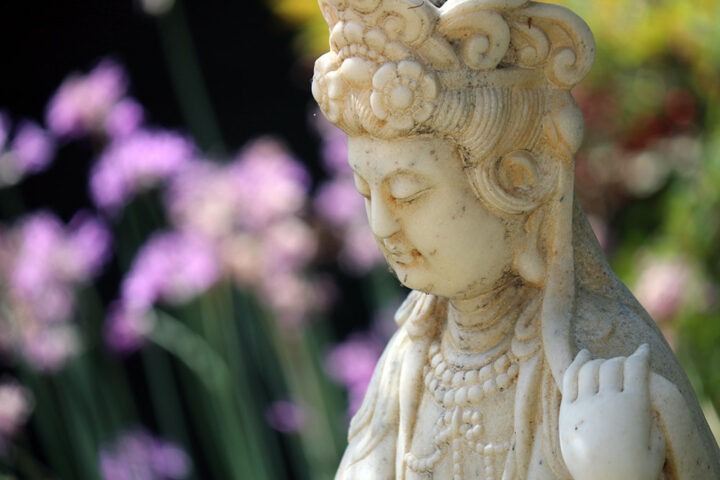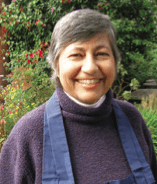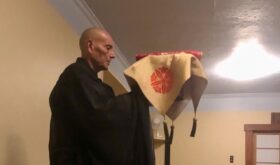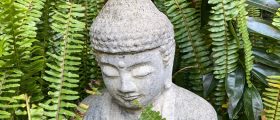Imperceptible Mutual Assistance

 by Carol Ryuzan Koshi Schmitt
by Carol Ryuzan Koshi Schmitt
What makes the ineffable real for you? It was my first practice period at Tassajara, January 1993. In the sutra book was a two-page excerpt known as “jijuyo zammai’’ from Dogen Zenji’s fascicle Bendowa, translated by Abe and Waddell. We would chant it in rotation with other sutras during morning service. There was a phrase in it, “imperceptible mutual assistance,” which penetrated me deeply and has been my cherished companion ever since.
There was a woman in the practice period from Yugoslavia who wanted to practice her English, and I heard that the Abbot had recommended to her that she memorize that sutra.
That seemed like a good idea to me, so I memorized the whole two pages. By this time, however, the translation in the sutra book had changed to Kaz Tanahashi’s translation which reads: “Because such broad awakening resonates back to you and helps you inconceivably….” Also good. In any case, Kaz’s is the translation I memorized, but “imperceptible mutual assistance” stayed deep within me.
The sutra says, “Because earth, grass, trees, walls, tiles, and pebbles all engage in buddha activity, those who receive the benefit of wind and water caused by them are inconceivably helped by the Buddha’s guidance, splendid and unthinkable, and awaken intimately to themselves. Those who receive these water and fire benefits spread the Buddha’s guidance based on original awakening.”
And later, “Grass, trees, and lands which are embraced by this teaching together radiate a great light and endlessly expound the inconceivable, profound dharma. Grass, trees, and walls bring forth the teaching for all be- ings, common people as well as sages. And they in accord extend this dharma for the sake of grass, trees, and walls. Thus, the realm of self-awakening and awakening others invariably holds the mark of realization with nothing lacking, and realization itself is manifested without ceasing for a moment.”
That was it. The image of trees, grass, tiles, and pebbles all showering me with dharma all the time filled my heart. And common people radiating it back for the sake of grass, trees, and walls fills me in a way I cannot describe in words. Dogen’s poetry reaches far closer to the ineffable than I can. Everything is empty and everything is awake. Breathing in, breathing out.
I was a beginning student at the time, and later began to learn about dependent co-arising, how everything arises together, that there are no separate selves, no separate entities of any kind, that things arise together and in their interactions co-create one another. “Imperceptible mutual assistance” was my introduction to this fundamental teaching of the Buddha, and I bow to it.
This is not to say there is not sorrow or suffering in the world. Of course there is, and plenty of it. Poignancy is both beautiful and sad. Loved ones get sick. With Covid, it’s harder to connect with people. The world might seem disappointing right now. But for me, Buddha nature is stronger. Joy is stronger, as long as I don’t overlay my supposed worries, problems, and craziness on top of it.
As I walk in my neighborhood, I touch the trees and thank them for the ways in which they support me, and for the ways in which they support one another.
In speaking about the Bendowa, I heard Roshi Egyoku say, “Dogen Zenji situates us in a generous universe.” Beautiful. I don’t know the causes and conditions which enable me to have faith in this generous universe, but I am grateful for them. I aspire to let go of everything within me which resists being in relationship with all of creation, with everything that is going on, and then to let go of it all. Whoosh!
The Sixth Ancestor, Hui-Neng, tells us, “You will attain liberation when you meet the good friend inside your own mind.” The phrase “imperceptible mutual assistance” has been the good friend I aspire to meet.
I personally don’t recommend studying or analyzing the “jijuyu zammai.” If you would like, please, just read it. Recite it out loud again and again. Memorize phrases that speak to you so that you know them by heart. That way you will always have them with you. May you enjoy them.
I am reminded of when Tianhuang said to Longtan, “When you greet me, I bow.”
Thank you very much for reading this.
Carol is a former ZCLA resident, currently living in Kansas City, MO.



